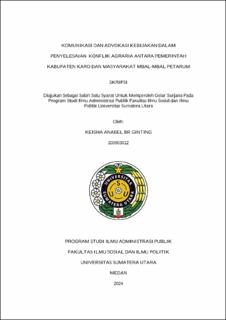| dc.description.abstract | Agrarian conflict is one of the problems that is rife in Indonesia. Issuance of Karo Regency Regional Regulation No. 03 of 2021 concerning Management and Provision of Public Grazing Areas, which aims to overcome horizontal conflicts on the land, apparently contributed to an agrarian conflict that occurred between the Mbal-Mbal Petarum Community and the Karo Regency Government. This causes the indigenous people or simantek of Kuta who depend on this land to lose their source of life. So this research aims to describe in detail policy communication and advocacy in resolving agrarian conflicts between the Karo Regency government and the Mbal-Mbal Petarum Community.
This research uses descriptive research methods with a qualitative approach. Data collection techniques were carried out by interviewing, observing and recording documents related to advocacy and policy communication in resolving agrarian conflicts. The data obtained was then analyzed qualitatively by reviewing all the data collected which was supported by the results of interviews with the theoretical approach proposed by John Hopkins, 1988 through analysis, strategy, mobilization, action, evaluation and sustainability. The results of the research show that communication and policy advocacy in resolving agrarian conflicts between the Karo Regency Government and the Mbal-Mbal Petarum Village Community were assessed in several stages. In the analysis stage, an analysis of the problem and causes of the problem is carried out. Then the strategy was built using KontraS discussion forums with the community and strengthening grass roots. In the mobilization, KontraS collaborated with GMNI and wrote to the central, provincial and regional governments. In the action stage, the Karo Regency Government responded to the movement carried out by the community together with KontraS to resolve the conflict by holding a Public Hearing Meeting. The evaluation shows that the struggle of the community and GMNI has not been maximized, apart from that the Karo Regency Government has not shown serious attention to this problem, seen from policy recommendations that have not been fully followed up. In continuity, the Karo Regency Government carried out outreach regarding the use of social forestry for farmers, then KontraS contacted Komnas HAM to participate in handling the conflict. | en_US |


